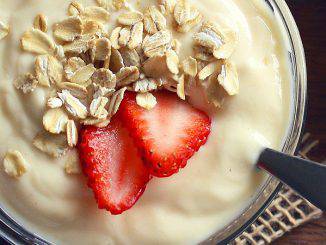
Let’s first clarify that in this article we are going mainly to discuss the effects of milk Kefir on breastfeeding mums and their babies. Although water Kefir is also considered safe while breastfeeding, its probiotic and nutritional powers are far inferior to the ones of milk Kefir.
Water Kefir also does not contain any calcium, and calcium is one of the ingredients of Milk Kefir that is most valuable for the breastfeeding mum’s baby. Moreover, fermentation may lead to an increased content of alcohol in Water Kefir, which is usually disadvised while breastfeeding.
So, let’s dig deeper into milk Kefir and its benefits for breastfeeding mothers and their babies.
Milk Kefir is undoubtedly an irreplaceable addition to any health-conscious diet, but is it really safe for the sensitive period of breastfeeding?
Most experts are positive that consuming milk Kefir while breastfeeding is safe, provided that both mum and baby are not affected by milk-related allergies.
Indeed, allergies are a widespread problem and should always be addressed with adequate consideration. It is worth mentioning though that milk allergies are often mistakenly confused with milk intolerance (a.k.a lactose intolerance), and these two terms are very different.
While milk allergy is a severe autoimmune disease that may lead to violent reactions, lactose intolerance is a relatively common health condition, affecting between 65 and 70% of the world’s population, and it can be easily prevented and cured.
In case of doubt, it is always a good idea to start with small, “testing” quantities of milk Kefir first, and then increase the dosage to normal levels (up to 200-300 ml. per day) if no allergic reactions or any other signs of milk-related hypersensitivity occur.
So, aside from potential allergic reactions, Kefir is considered perfectly safe and beneficial for breastfeeding mothers.
Experts suggest that Kefir is not only useful but also necessary for breastfeeding because it not only helps to increase the amount of breast milk but also improves its quality.
What are the benefits of Kefir while breastfeeding?
Kefir Stimulates lactation
Milk Kefir stimulates lactation. As we all know, the food the mother eats directly affects the quality of her milk. If a woman cannot breastfeed due to a lack of sufficient milk, the use of Kefir will help, as in the first place, Kefir contributes to lactation and stimulates it.
Kefir Saturates milk with nutrients
In addition, regular consumption of Kefir saturates breast milk with nutrients and microelements that are extremely useful for the baby. It is a valuable source of calcium, which is vital for breastfeeding moms and their babies.
Kefir Improves mum’s digestion
Kefir also improves digestion and protects against constipation, and after childbirth, many women may often experience manifestations of hemorrhoids, which hard stools may aggravate. That’s why the consumption of Kefir could be very beneficial for alleviating these symptoms due to its laxative effect.
Kefir helps to populate the baby’s gut with probiotic bacteria
Before babies are born, their gut is sterile and their intestinal microbiome is practically non-existent. At the moment of birth, the gastrointestinal tract starts to populate with the beneficial probiotic bacteria during and right after delivery, most notably through the mother’s breast milk.
That is why the inclusion of probiotic bacteria in the mother’s diet may be crucial for developing a balanced microbial population in the baby’s gut that will later serve as the base of a reliable immune system.
Although the beneficial bacteria of Kefir do not get directly transmitted to the baby through breast milk, the mother’s gut microbiome plays a vital role in the quality of her breast milk. Therefore, a healthy mum’s gut is essential for beneficial breastfeeding and is connected to all aspects of a baby’s health and immunity even before delivery.
Human milk may contain up to 700 different strains of bacteria, including probiotic strains such as Lactobacillus, Streptococcus, Staphylococcus, and Bifidobacterium. So, as we said, although, although Kefir’s probiotics do not get directly transmitted to the baby, the mother’s gut microbiome plays an important role in transmitting through her breast milk all bacteria the baby needs to build its own healthy bacterial population of the guts.
Bifidobacteria contained in Kefir are among the typical inhabitants of the human intestinal tract throughout their entire life. They are also the predominant microorganisms in the gut of breastfed babies. It has been confirmed that breastfed babies are considerably less prone to diarrhea and other gastrointestinal problems than infants that don’t get breast milk.

Here are the main benefits of Kefir to breastfeeding mums:
- Kefir improves the absorption in the intestines of various nutrients, vitamins, and minerals.
- Kefir replenishes the calcium reserves of mum’s body. Kefir contains large amounts of calcium, and the body of a newborn requires significant amounts of calcium and mineral salts for the growth and maturation of its muscular system and skeleton.
- Kefir strengthens the immunity of the nursing mother and her baby due to a series of biologically active compounds and beneficial bacteria.
- Kefir increases regenerative abilities. Kefir contains complex carbohydrates that stimulate the healing process in any damaged tissues.
- Kefir reduces the likelihood of developing allergic reactions due to the modulation of the immune system.
- Kefir improves the functioning of the nervous system – it is a source of water-soluble B vitamins, which are necessary for all metabolic processes in the cells of the nervous system.
Beyond that, the intake of Kefir while breastfeeding can reduce the likelihood of the baby developing lactose intolerance in the future.
How to introduce Kefir to breastfeeding mum’s diet?
Kefir may rarely cause any undesirable reactions during the breastfeeding period. Yet, the inclusion of any new foods in lactating mum’s diet should be done with care.
First, as we already said earlier, the breastfeeding mother should ensure that she and her baby are not allergic to dairy products.
Let’s remind you one more time that milk allergy and milk (or lactose) intolerance are very different health conditions. While lactose intolerance is a relatively mild condition due to the inefficient processing of milk products in the gastrointestinal tract, milk allergy is a severe autoimmune disease that may result in violent and even life-threatening reactions of the body, including anaphylaxis.
That is why it is essential for breastfeeding mothers to introduce Kefir to their diet slowly and carefully.
An initial trial dose of no more than 50-60 grams (2 oz) is recommended. Then, if everything looks fine (for both the mum and the baby), the dosage may be gradually increased to 1 or 2 cups per day.
Kefir is generally not recommended for any gastrointestinal diseases such as stomach or duodenal ulcers, gastritis, or pancreatitis.
The nursing mother should, by all means, ensure that the Kefir she takes is of good quality.
Breastfeeding mothers should never take any fermented milk products (including Kefir) made of unpasteurized or “raw” milk.
Raw milk may contain hazardous bacteria like Brucella, and the fermentation process in Kefir does not eliminate them. Always use pasteurized or, at least, pre-boiled milk.
Even though Kefir contains a negligible amount of alcohol, nursing mothers can consume it without any problems. Numerous studies in this regard show that alcohol does not penetrate milk due to its low concentration in milk Kefir (up to 0.7% max).
With regular use, yogurt helps to normalize the digestive process. This point may be essential for mothers who face constipation and other gastrointestinal problems during pregnancy and lactation.
Kefir also prevents any processes of putrefaction and unwanted fermentation in the mother’s intestine that may often cause severe deterioration in the quality of her breast milk and even be dangerous for the baby.
Finally, Kefir contains Tryptophan, which has a calming and relaxing effect on the nervous system and relieves fatigue. Kefir also allows mothers to lose the excess weight accumulated during pregnancy.
Note that most scientific studies and research data declaring usage of Kefir safe while breastfeeding is based on advised dosage and may not be entirely accurate for higher dosage. Therefore, in the beginning, it is always a good idea to be careful and slightly conservative.
Summary
Specialists are unanimous that consuming Kefir while breastfeeding is safe, provided that both mum and her baby are not affected by milk-related allergies.
Kefir improves the absorption in the intestines of various nutrients, vitamins, and minerals, and replenishes the calcium reserves of mum’s body. Kefir contains large amounts of calcium, which is vitally important for the growth of the muscular system and skeleton of the baby. It also strengthens the immunity of both the nursing mother and her baby.
The most important asset of Kefir is that it helps to populate the baby’s gut with the needed beneficial bacteria that will later serve as a base for a stable and balanced immune system. Babies are born with a sterile gastrointestinal tract and it is vitally important for them to develop a balanced microbial population in their gut. One of the best and easiest ways to achieve that is through the mother’s breastmilk which may be enriched with the valuable probiotic bacteria of Kefir.
However, to stay on the safe side, breastfeeding mothers should take some precautions when it comes to Kefir.
First of all, breastfeeding moms should never take the risk of consuming Kefir made of unpasteurized (or “raw”) milk. Unpasteurized milk can contain harmful bacteria that the fermentation of Kefir will not neutralize.
Secondly, it is always a good idea for breastfeeding mothers to introduce Kefir slowly and carefully. An initial daily dose of 50-60 grams (2 oz) is recommended, and then, if everything for both the mum and the baby is fine, increase the dosage to 1 or 2 cups a day. Kefir is a powerful probiotic food and some stomachs may need initial periods of adaptation.
Related questions
-
Is all that’s said on this page equally valid for Milk and Water Kefir?
No. The information on this page relates primarily to Milk Kefir. Although Water Kefir is still a potent probiotic drink, its probiotic and nutritional value are far inferior. Water Kefir also does not contain any calcium, and calcium is one of the ingredients of Milk Kefir that is most valuable for the breastfeeding mum’s baby. Moreover, fermentation may lead to an increased content of alcohol in Water Kefir, which is usually disadvised while breastfeeding.
Related resources
- What is kefir?
- Is Kefir safe during pregnancy?
- Is Kefir good for the skin?
- Can Kefir help with weight loss?
- Can Kefir help with high blood pressure?
- Can Kefir help with acid reflux?
- Kefir and IBS
- Kefir benefits.
- Kefir pros and cons
- Kefir and Diabetes
- Kefir and lactose intolerance



